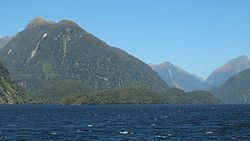Elizabeth Island (Māori: Pōkaikōkō) is the largest island in the inner Doubtful Sound, in Fiordland National Park, in New Zealand's South Island. It was created during the last glaciation, its narrow long shape aligned with the direction of the fiord. The island is uninhabited and entirely covered in dense native bush.
Pōkaikōkō | |
|---|---|
 Elizabeth Island in front of tall mountains of Doubtful Sound | |
| Geography | |
| Location | Doubtful Sound |
| Coordinates | 45°25′0″S 167°7′15″E / 45.41667°S 167.12083°E |
| Area | 0.6 km2 (0.23 sq mi) |
| Length | 2.6 km (1.62 mi) |
| Width | 0.4 km (0.25 mi) |
| Highest elevation | 117 m (384 ft)[1] |
| Administration | |
| Demographics | |
| Population | 0 |
The island was named by Captain John Grono after his brig Elisabeth in late 1822 or early 1823 (itself named for his wife).[2]
The waters surrounding Elizabeth Island are protected by the Taipari Roa (Elizabeth Island) Marine Reserve. The western side of the island, facing the main flow of Doubtful Sound, contains extensive rock wall habitats. Off the southern end of the island are deep kelp beds. To the east of Elizabeth Island lies a shallow channel with high water flow, containing Olphert Cove and the mouth of Elizabeth River. This area is also home to black and red coral.[3]
See also
editReferences
edit- ^ "Elizabeth Island, Southland – NZ Topo Map". NZ Topo Map. Land Information New Zealand. Retrieved 10 November 2016.
- ^ Discover New Zealand:A Wises Guide (9th ed.). 1994. p. 452.
- ^ "Taipari Road (Elizabeth Island) Marine Reserve". Department of Conservation. Retrieved 10 November 2016.
